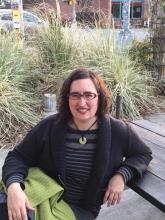Molly De Marco's blog
The Marian Cheek Jackson Center, in collaboration with UNC and Self Help Credit Union, is leading a process to develop strategies to shift the Northside neighborhood's trajectory away from increasing student housing and decreasing long-term single family housing to be more diverse (in 1980 the neighborhood was 59.3% African American and by 2010 is was down to 23.8% - data from Self Help/Jackson Center).
These partners have created a Compass Group of current and former residents of Northside and other interested parties. Through meetings with this Group and conversations with Northside neighbors a list of 5 community aspirations was developed:
1. Preserving a sense of culture and community identify, as well as preserving African-American land ownership in Northside;
2. Helping long-term residents improve their housing conditions and quality of life;
3. Minimizing the negative impacts of student renters/rentals, and perhaps cooling off the student rental market;
4. Maintaining/restoring a close-knit, proud community, and
5. Building a neighborhood that attracts a diverse range of individuals and families going forward.
Back in March, the CHCYMCA Board of Directors stated during their board
meeting that all plans to merge with the YMCA of the Triangle were on
indefinite hold after a commuity outcry because of the discriminatory
practices of the YMCA of the Triangle. More on this story can be found in this OP post, this post, and this post.
However, members of the Chapel Hill Carrboro YMCA received this email from the interim CEO yesterday (Oct. 18th, 2012):
Tonight, the Chapel Hill Downtown Partnership held its 2nd of four moving conversations inspired by urbanist and community activist Jane Jacobs. This moving conservation, called Inspiring Innovative spaces, focused on existing and planned spaces downtown that promote interactions to spark ideas. Jacobs noted that the most successful public spaces are those with intense use nearby.
After years of planning and community discussion, the Orange County Board of Commissioners recently placed a referendum on the November ballot for a half-cent sales tax to support public transit. Together with state and federal contributions, the new revenue will support a 20-year investment in bus and rail service in Orange County. There are many reasons to support the transit tax, like reducing the environmental degradation wreaked by overreliance on car travel and the sprawl it generates. Often overlooked are the benefits of public transit for marginalized populations.
About a year ago, the Town of Chapel Hill amended its bus advertisement policy to spell out rules for ads with political messages. In August, the Church of Reconciliation in Chapel Hill placed an ad that shows a Jewish and a Palestinian grandfather each with a grandchild and reads “Join with us. Build peace with justice and equality. End U.S. military aid to Israel.” The ad stirred up a controversy and led to a petition from citizens to change the bus ad policy to disallow such ads. The current policy is available online at http://www.townofchapelhill.org/Modules/ShowDocument.aspx?documentid=15328.
On Friday, the ACLU of North Carolina sent a letter to the Chapel Hill town manager and elected officials outlining why changing the bus ad policy would violate the free speech clause of the First Amendment. Below is the ACLU-NC press release. The full letter is available here.
Pages
About Us
OrangePolitics is a not-for-profit website for discussing progressive perspectives on politics, planning, and public policy in Orange County, NC. Opinions are those of their authors. Learn more.
Community Guidelines
By using this site, you agree to our community guidelines. Inappropriate or disruptive behavior will result in moderation or eviction.
Zircon - This is a contributing Drupal Theme
Design by
WeebPal.


